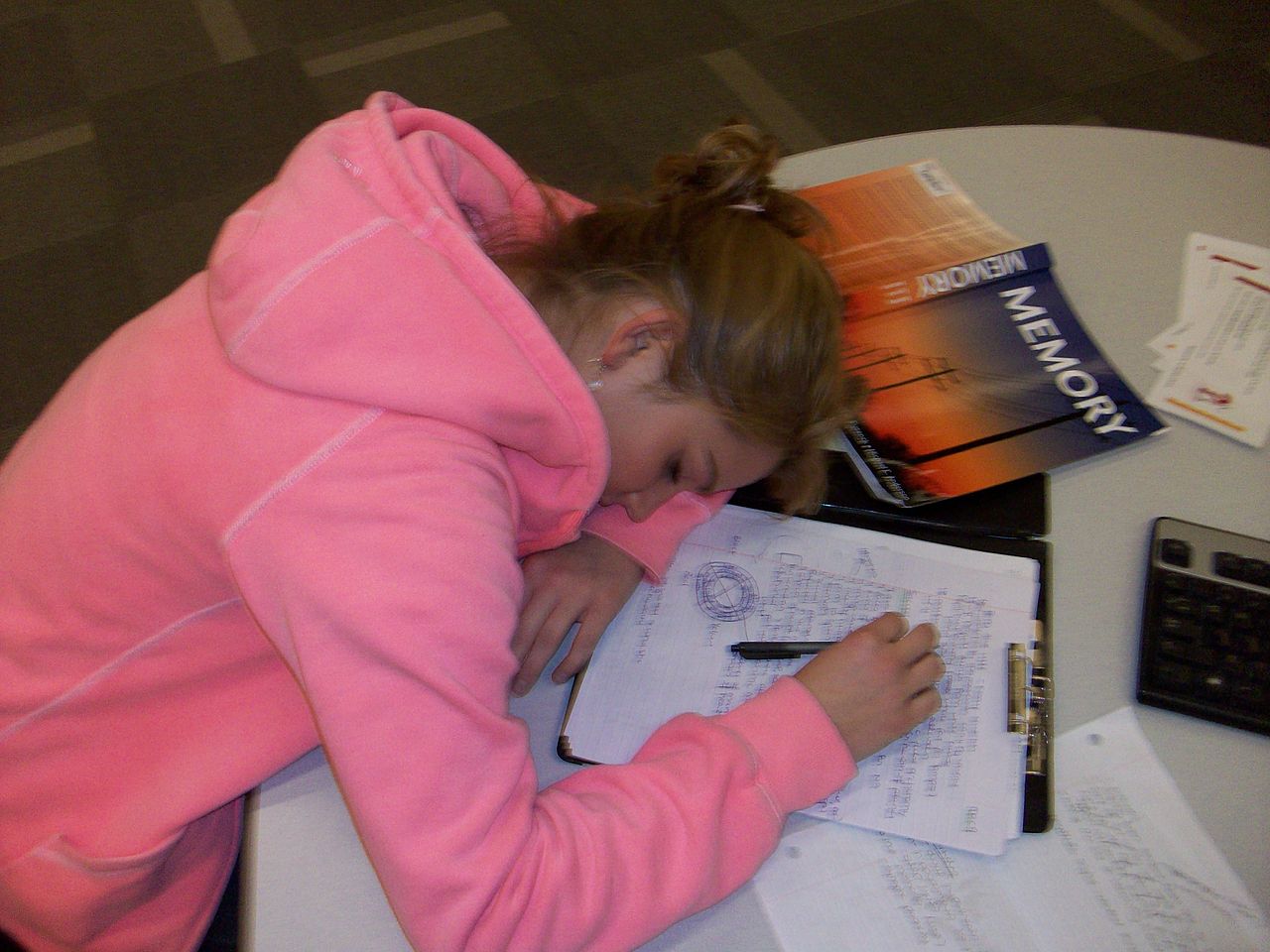How college affects students’ sleeping habits

By: Ameema Amin
Photo: Wikimedia Commons
The scientific definition of sleep, as per the Stedman’s Medical Dictionary, is “a natural periodic state of rest for the mind and body, in which the eyes usually close and consciousness is completely or partially lost, so that there is a decrease in bodily movement and responsiveness to external stimuli.”
Sleep is crucial to the normal functioning of the mind and body. Lack of sleep can affect thinking and learning. It can increase the risk of accidents and injuries.
Sleep deprivation is associated with anxiety, stress, high blood pressure and cardiovascular disease. These associations have led the medical community to emphasize the importance of sleep.
While studying sleep, experts recognized that there are many factors that prevent people from getting adequate sleep. This led to the concept of sleep hygiene. According to the American Sleep Association, sleep hygiene is “referred to as the recommended environmental and behavioral practices designed to promote better quality sleep.”
In people’s daily life, there are many disturbances and distractions that prevent many of us from getting to sleep on time. On The American Sleep Association’s website, there are many tips and tricks in order to help the community to become more knowledgeable on how to improve their sleep hygiene.
Some of the tips listed on the ASA include limiting exposure to light prior to sleep, maintaining a regular sleep schedule, exercising regularly, and avoiding caffeinated drinks and inappropriate substances that interfere with sleep. The statistics portion says, “adults need an average of 7-9 hours of sleep every night.”
Three students were interviewed: sophomore Noelle Larino, junior Alison Tett, and junior Lucy Campbell.
The students were asked how much sleep they get.
Larino: “Every night I get about at least 7 hours of sleep.”
Campbell: “4-7 hours a night.”
According to the NIH, “studies show that a good night’s sleep improves learning.”
Q: “Do you think the amount of sleep you get is enough for your daily functioning?”
Larino: “Probably not as I usually should because I become tired during the day.”
Tett: “It depends on the amount. The less sleep I get, the harder it is for my daily functioning. And then vice versa.”
Campbell: “Sometimes the minimum, but yes”
According to the National Sleep Foundation, “the use of electronic devices in the bedroom further disrupts the natural pattern of sleep-wake cycle.”
In order for us to know how to fix the problem, we must first learn what these distractions and disturbance are so that we can assist people with sleeping on time.
Q: “Do you think there are any distractions or disturbances that prevent you from going to bed at an earlier time?”
Larino: “Homework and distractions on my phone prevent me from going to sleep earlier.”
Tett: “Yes there definitely are. It’s usually getting distracted by my phone, homework, online games, and hanging out with friends.”
Q: “Are there any distractions that prevent you from going to sleep at an earlier time, and if so, do you have any distractions that disrupt your sleep? Do you have any techniques or strategies to avoid these certain disruptions?”
Campbell: “Yes. My phone and computer can be distracting. Using the headspace app is helpful.”
Based on the responses from above, technology is one of the main factors that mainly disrupts student’s natural sleeping patterns. However, there are also other factors that contribute to lack of sleep to our natural sleep patterns on a daily basis, such as a lifestyle change or a career that is more demanding such as being a doctor or teacher.
Q: “Do you think college has changed or disrupted your sleep pattern?”
Larino: “I have a lot more work in college and going to a job has disrupted my sleep schedule.”
Tett: “I think it has changed it a little bit. I can definitely stay up later (though not enough to pull an all night) and wake up later than usual.”
Campbell: “Yes, I stay up later on weekends and spend more time doing work and with friends that could be used for sleep.”
The students expressed that college has somewhat effectively changed their sleeping pattern. Most of them appear to be sleeping less due to the severe impact of many external factors that may have delayed or distracted them from going to sleep earlier than planned.
Q: “How does sleep affect your mentality?”
Tett: “It affects my mentality by the less amount or less of a quality of sleep I get, the worse of a mood and temperament I am in. It is the same the other way too.”
Campbell: “When I sleep better I am happier, calmer, and overall function better.”
The interviewees agreed that their mood and concentration is affected negatively when they don’t get enough sleep compared to their average amount of sleep a night. Many agreed that when they are somewhat or completely rested, they perform better and are calmer and collected.
When assessing the quality of sleep in college students, it appears that the universal theme is that students are not getting enough sleep. There seem to be many common external factors that creates poor sleeping habits such as homework, deadlines, tests, social life, and technology.
It would be a positive step to increase awareness about the importance of sleep and the concept of sleep hygiene in college students. This can be done as part of the initial student orientation and also as periodic reminders through Marymount email messages from Student Health.
 The Banner
The Banner